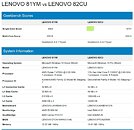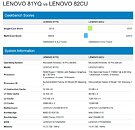Monday, July 6th 2020

Intel Core i7-1165G7 "Tiger Lake" Mauls Ryzen 7 4700U "Renoir" in Most Geekbench Tests
Intel's upcoming Core i7-1165G7 4-core/8-thread processor based on the 10 nm "Tiger Lake-U" silicon packs a mean punch in comparison to the AMD Ryzen 7 4700U processor, despite half the number of CPU cores. A Geekbench comparison between two Lenovo laptops, one powered by an i7-1165G7, and the other by a 4700U, shows a staggering 36.8% performance lead for the Intel chip in single-threaded performance, while also being 0.5% faster in multi-threaded performance. The i7-1165G7 features a 4-core/8-thread CPU with "Willow Cove" cores, while the 4700U lacks SMT, and is an 8-core/8-thread chip with "Zen 2" CPU cores. The game changes with the Ryzen 7 4800U, where the 8-core/16-thread chip ends up 22.3% faster than the Core i7-1165G7 in the multi-threaded test owing to SMT, while Intel's single-threaded performance lead is lowered to 29.3%.
Sources:
Geekbench Database 1, 2


43 Comments on Intel Core i7-1165G7 "Tiger Lake" Mauls Ryzen 7 4700U "Renoir" in Most Geekbench Tests
On the otherside, if this is true, then that means that this U low power chip is basically as fast as a desktop gaming pc running intel 9th gen :
20% faster in single threaded mode than the Ryzen 3700X. Floating point performance is simply outstanding (see SFFT test). The 8-core CPU is just 50% faster despite having twice as many cores. Overall, it's a huge achievement considering that the 3700X consumes up to 91W while this TGL CPU is limited to 25W.Yet GB5 represents real life performance quite well unlike GB4 which had certain glaring issues, e.g. it favoured RAM speeds (the test was completely removed in GB5) and AES performance quite a lot (it has a much less performance impact on the final scores in GB5).GeekBench is an independent company which has never been known for favouring any CPU/GPU vendor. Your criticism is completely unwarranted.
I pity whoever unironically believes a 25W CPU has similar performance to a 125W+ desktop CPU, imagine being this gullible. Intel's 10nm went from barely any better than 14nm to providing 5-6 times the efficiency ? Right.
IF you would took 5 minutes from your time, you would have seen that Ice Lake already has 10% better IPC vs Zen 2 aaaand Tigerlake adds at least 5 more over that. Wtf people can't use their brains is sad.
Add 15% better IPC with possibly higher frequencies and you get 25-30% better ST score. What is so hard to believe? Ah, it is because your AMD will always be the best bubble is bursting? Guess what, Intel had process issues (that is fabrication issues) not IP issues. Intel already has many more cores with much higher IPC ready so stop believing AMD is some kind of technical god that no one can ever touch again.
AMD is using 7nm process vs a shitty 10nm. AMD is using latest and greatest uArch designed by Jim Keller vs a dinosaurus age Skylake uArch. No wonder it wins, it is like comparing Bugatti Chiron with Mercedes Benz SL55 from 2000. No shit it wins by a mile. But don't ever go into believing Intel doesn't have better IP than AMD. The fact that it can't fabricate is one thing, but otherwise, there is no contest.
BTW muticore score is practically the same, so no mauling this time
Zen 3 significantly improves FP performance as well, although to be fair Zen 3 APU is a fair way off, and TGL is only a few months away. On the other hand, at least we're back to a period of leapfrogging performance between the two vendors. And AMD would suggest putting your heavily multithreaded FP code onto a compute-oriented GPU anyway.
And as always, let's wait to see the cost of devices using TGL versus the known cheap pricing of devices using Renoir. And let's wait to see a wide range of benchmarks instead of GB.
Additionally, AMD's move to 8C in mainstream and 16C in enthusiast has push Intel to up the core count as well, which increases die sizes to further constrain product availability.
And finally, Intel put too much GPU in TGL and not enough CPU. 4C8T is performing admirably, but you can imagine a 6C12T chip with 64EUs would have been more balanced - however Intel had their targets. 15W TGL will perform well in GPU without needing the low-end dGPU that many Intel laptops have.
Either this is no where near 25W, think of the 135W mobile 10th series CPU that Intel classify as being "45W" or Geekbench is being a garbage benchmark as always. Or a combination of both.